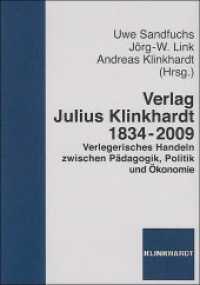Full Description
This volume in the Weapons of Mass Destruction series makes the case that the United States' expansive missile defence policy has eroded both its own security and that of its allies. These findings are based on an examination of the response of a number of key states to U.S. policy, including Russia, China, North Korea and Iran. Situating their argument in the theoretical debate on balancing in unipolarity, the authors contrast their view to influential perspectives that see little evidence of hard balancing against the U.S. in the post-Cold War era. Adopting a neorealist perspective, the authors demonstrate the clear presence of this inter-state practice, providing insight into the international politics of unipolarity, showing how hard balancing and security dilemma-related dynamics operate in the contemporary strategic environment.
Contents
Chapter 1. Missile Defense Politics: Unipolarity, the Security Dilemma and the Balancing Debate
Chapter 2. Russia and Lavrov's "Law of Politics"
Chapter 3. China and the Nuclear Politics of Power Transition
Chapter 4. Iran's Response to Missile Defense
Chapter 5. North Korea's Nuclear Quest
Chapter 6. U.S. Missile Defense: Security at a Price







